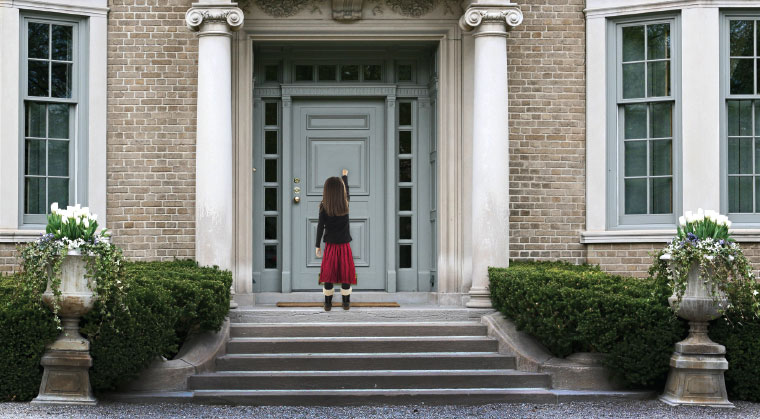My Career as a Schnorrer

I couldn’t believe it. How did they know who was at the door? And what I was there for? How could they be so cruel?

I
started my schnorring career at the ripe old age of six.
Perky in my sharply pressed uniform and new spring shoes, I planned my route and practiced my sales pitch. “My school is selling plants, lekavod Shavuos. Do you want to buy one?”
What I lacked in height, I made up for in confidence and drive. Confidence, because I couldn’t think of one reason why I shouldn’t succeed. And drive, because this was a school contest — the class that made the most sales would be awarded a trip. There was no way we wouldn’t win.
Business savvy dictated that I focus on the fancy houses. Fancy houses meant rich people, and rich people would surely buy plants, probably the most expensive plants on offer, because they had so much money. I started on the prettiest block in the neighborhood, filled with huge brick structures with stunning landscaping.
That’s when I learned my first lesson in the schnorring business: Rich people are never home.
Door after door, I rang the bell, waited, rang again, waited some more. After a few houses, I became smarter and started skipping the houses that had no cars parked in the driveways.
And then I spotted a gleaming black car pull into the driveway of the most beautiful house I’d ever seen. My heart started racing. A sale! I waited patiently as a couple got out of the car and entered the house. I waited another two minutes, because to my six-year-old social instincts that felt like the right thing to do. Finally I bounced up the steps and gleefully chimed the doorbell.
No answer.
I rang again. And again. And again.
Four times, I rang. This didn’t make any sense. Had I been dreaming? No, the black car was still there, and I couldn’t have imagined seeing those people enter the house.
I rang again.
At last, the intercom crackled to life. I grinned broadly, clearing my throat and preparing to make my pitch. The static cleared, and then I heard, “If I didn’t answer after four rings, you think I’ll answer after five?”
My world caved in. I couldn’t believe it. How did they know who was at the door? And what I was there for? How could they be so cruel?
I ran down the stairs, blinking back tears. I ran away from that house, from that block with the fancy-shmancy houses. I wanted to run home and quit my job right there.
But six-year-olds don’t quit so fast, especially not with the prospect of winning a school contest. With subdued enthusiasm, I continued ringing doorbells, this time avoiding the mansions.
The sales trickled in. Some people gave a dollar and didn’t buy anything, which was nice but not quite satisfying. Here and there, a person ordered a five-dollar plant. I carefully wrote down their names and addresses, my hand shaking with excitement. One person ordered a fifteen-dollar plant, and I nearly kissed her.
Ann Kahan, an old lady who lived across the street from my house, was thrilled when I rang her bell. She asked questions about all the plants I had to offer, and I eagerly told her about the plant my mother had bought several years back (my sister had made that sale), which blossomed so beautifully that she had to repot it to accommodate the growth. Ann bought two of those five-dollar plants. My money baggie was filling up.
Every day after school, I’d eat supper and do my homework super fast, then head out to sell plants. Sometimes I’d start on a block and learn that a different girl had beaten me to it. “I already bought a plant from a different girl, sorry,” the women told me. I’d reroute and pray for better luck.
One day a woman wrote out a check in the amount of $36. I was speechless. (I was also a tad disappointed, because she didn’t want a plant, and also, a check wasn’t dollar bills. Did it count for our contest?)
And then, further down the block, I was buzzed into a house by a very old lady. The house was dimly lit and reeked of moth balls. The woman trudged over the carpet, rings of loneliness shadowing her. I followed her into the living room, uneasy.
On the center of a coffee table, I saw a little glass dish filled with coins. The woman fished around with trembling fingers, counting quarters. At last, she handed me two crumpled dollar bills and three dollars in change. She chose a plant from my flyer, but I couldn’t — I couldn’t make that sale. I couldn’t take money from this woman. If she gave me those coins from the few pennies she owned, how would she have money for food? I was sure that the money in that glass dish was all the money the woman owned.
That was my innocent introduction to the world of fundraising. I thought I was in it for a contest, but my encounters with people were life altering.
Luckily, my shaky start didn’t bruise my attitude toward tzedakah. Wherever I turn, I encounter people with sincere pleas. A cousin with enormous tuition bills for a child with special needs. Parents of a kallah who are financially lost. They reach out with their simple appeals, through phone calls or personal e-mails, and hearts connect. Sometimes I’m the one who gives, remembering the generous ladies at the doors and striving to emulate their benevolence. And sometimes, I reach out to others, collecting for a cause that’s near and dear to me.
Then there’s the “fad” fundraising. You drop the hundred things you’re in middle of doing to take a call, then bang the receiver down in frustration as music plays and a recorded voice tells you how you can be the winner of $20,000. Colorful Chinese auction books arrive in the mail.
And behind all the marketing and razzle dazzle, there’s a nation of good people, people who care for others and tirelessly pitch their causes. Door-to-door collectors, automatic monthly payments, anonymous benefactors. Whatever the approach, there’s a human spirit in all those charities; real problems, real lives, real people.
And money baggies fill up.
(Originally featured in Family First, Issue 575)
Oops! We could not locate your form.






